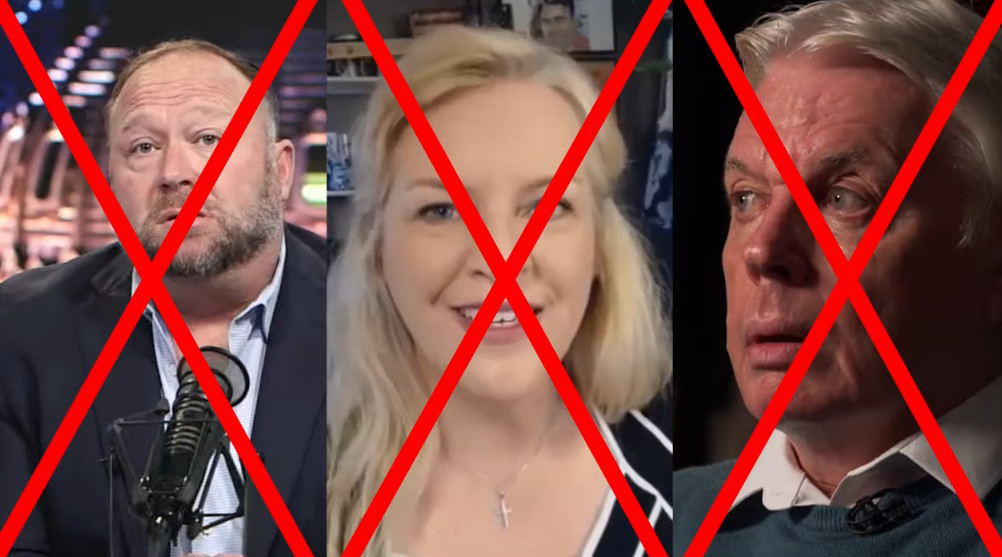
In "Constantly Wrong," @remixeverything continues his brilliant mashup video work on conspiracy theories with a new, 47 minute documentary that contrasts real-world conspiracies (crimes) with conspiracy theories.
1/
1/

Ferguson says you can tell the difference because conspiracies collapse as the complexity of maintaining secrecy among conspirators reaches unsustainable levels, while conspiracy theories posit that there are long-lived conspiracies that somehow solve this problem.
2/
2/
It's an argument others have made, but he makes it very well, in part through of his dazzling video-editing and encyclopedic storehouse of snippets that go into his mashups. It's what made Ferguson's "Everything Is a Remix" videos so stunning.
everythingisaremix.info
3/
everythingisaremix.info
3/
Ferguson's upfront that he's not looking to convert conspiratorialists into skeptics - rather, he's wants to equip skeptics who've lost loved ones to conspiracism with arguments that they can use in compassionate dialogues to try to bring those people back up the rabbit-hole.
4/
4/
Ferguson doesn't dwell much on why people become conspiracists, but to the extent that he does, he attributes it to trauma - in emotional wounds that demand succour. He's echoing @annamerlan's hypothesis from her brilliant 2019 book REPUBLIC OF LIES.
memex.craphound.com/2019/09/21/rep…
5/
memex.craphound.com/2019/09/21/rep…
5/
Namely, that a rise in conspiracism comes from a rise in actual conspiracies, and the trauma these engender. For example, there was and is a conspiracy to allow powerful people to sexually abuse children with impunity, from the church to Jeffrey Epstein.
6/
6/
And beyond - to the unwillingness of authority figures to punish abusers (parents, teachers, coaches). Many suffered directly (and even more indirectly) from these conspiracies, and the combination of trauma and real conspiracies makes people vulnerable to Qanon nonsense.
7/
7/
Or the disregard for human life displayed by pharma giants - think Oxycontin and the Sacklers - and the indifference of regulators both traumatizes people and primes them to believe anti-vax, whose core is "Pharma will kill you to make a buck and regulators don't care."
8/
8/
Both Merlan and Ferguson point to conspiracism as a problem of epistemology, not belief. Rather than focusing on WHAT conspiracists believe, focus on WHY they believe:
* the ubiquity of real conspiracies (which we also call "corruption"), and
* the trauma these create.
9/
* the ubiquity of real conspiracies (which we also call "corruption"), and
* the trauma these create.
9/
Ferguson's work is always a delight. That said, I have a quibble with his litmus test for sorting conspiracies from conspiracy theories: if the difference is that conspiracies eventually come to light but theories go on forever, what about a pre-exposure conspiracy?
10/
10/
He cites Jeffrey Epstein as an example of a conspiracy and not a conspiracy theory because Epstein was eventually exposed. But there were YEARS when Epstein was committing crimes with impunity thanks to complicity from law enforcement and politicians.
11/
11/
Epstein - like other conspirators - used legal threats and worse to attack people who threatened to expose him (think of Harvey Weinstein hiring ex-Mossad agents to harass women who publicly accused him).
12/
12/
So there was a period when Epstein was a "conspiracy theory" (because his crimes hadn't been brought to light and publicly acknowledged) and then they became a mere "conspiracy" - in public view.
13/
13/
In that period, how could you determine whether Epstein was a "conspiracy theory" or an underripe "conspiracy"?
Without a good answer, I fear that conspiracists will simply argue that Q or Pizzagate or anti-vax are still ripening and will bear fruit in the future.
eof/
Without a good answer, I fear that conspiracists will simply argue that Q or Pizzagate or anti-vax are still ripening and will bear fruit in the future.
eof/
• • •
Missing some Tweet in this thread? You can try to
force a refresh











